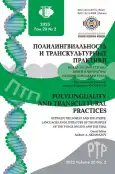Bilingualism in the Author’s Translation of the National Epic: on the Material of “Mastorava”
- Authors: Sharonov A.M.1, Sharonova E.A.2
-
Affiliations:
- Scientific Center for Socio-Economic Monitoring
- Mordovian State University N.P. Ogaryova
- Issue: Vol 20, No 2 (2023): BETWEEN THE FOREST AND THE STEPPE: LANGUAGES AND LITERATURE OF THE PEOPLES OF THE VOLGA REGION AND THE URAL
- Pages: 298-311
- Section: THEORY AND PRACTICE OF TRANSLATION
- URL: https://journal-vniispk.ru/2618-897X/article/view/326700
- DOI: https://doi.org/10.22363/2618-897X-2023-20-2-298-311
- EDN: https://elibrary.ru/LLLPRX
- ID: 326700
Cite item
Full Text
Abstract
In 1994, the Erzya epic “Mastorava” was published in the Erzya language. The success of this work made us think about the need for its translation into Russian. It was decided to entrust the translation to the author of “Mastorava” - Alexander Markovich Sharonov, who is equally fluent in Erzya and Russian. The relevance of the study is determined by the enduring interest in the phenomenon of bilingualism in the author’s translation of the national epic. A bilingual poet translating his own text is in a more difficult situation than a poet translating interlinear. For the former, hearing the music of both languages, seeks to harmonize it, to make its sounding adequate in the spaces of these languages. He is faced with the task of synchronizing the work of figurative and semantic series, preserving the authenticity of Erzya mythological and folklore images, moving them into the space of Russian images and meanings that instantly begin to appear with the first sounds of the Russian word, and arrange everything so that the national retains its uniqueness. This work is given to a bilingual translator with great effort precisely because he hears and feels both languages, he is aware of the nuances of meanings and semantic nuances. While the interlinear translator exists in the sound and semantic spaces of only one language and does not see the details. The translation of the text of a work of art is complicated by its metaphorical figurativeness, which allows for a variety of perceptions, and hence the difficulty in conveying its meaning, assumed by the author. However, high-quality translation moves a work from one language to another language, from one literature to another literature, expanding, enriching and complicating the scope of its existence. Research methods: descriptive, genetic, comparative.
Keywords
About the authors
Alexander M. Sharonov
Scientific Center for Socio-Economic Monitoring
Email: sharon.ov@mail.ru
SPIN-code: 5550-5047
Doctor of Philology, Professor, Chief Researcher of the Scientific Center for Socio-Economic Monitoring, Department for Monitoring Social Processes
st. B. Khmelnitsky, 39a, Saransk, Rebublic of Mordovia, 430000, Russian FederationElena A. Sharonova
Mordovian State University N.P. Ogaryova
Author for correspondence.
Email: sharon.ov@mail.ru
ORCID iD: 0000-0003-0221-4427
SPIN-code: 4820-3264
Doctor of Philology, Professor, Professor of the Department of Russian and Foreign Literature
st. Bolshevik, d. 68, Saransk, Republic of Mordovia, 430000, Russian FederationReferences
- Kolyhalova, O.A. 1999. “Sociocultural and philosophical aspects of bilingualism”: Doctoral Thesis. Moscow, 44 p. Print. (In Russ.).
- Butina, P.M. 1971. “On the Problem of Language Contacts (Based on Turkic Lexical Elements in English)”: Candidate Thesis. Almaty, 26 p. Print. (In Russ.).
- Konovalova, E.A. 2011. “The problem of definition of bilingualism”. Uchenye zapiski Tavricheskogo nacional’nogo universiteta im. V.I. Vernadskogo. Seriya “Filologiya. Social’nye kommunikacii” 24 (63): 263–271. Print. (In Russ.).
- Valuitseva, I.I., and G.T. Khukhuni G.T. 2015. “Literary Bilingualism: Pro and Contra”. Bulletin of Peoples’ Friendship University o Russia: Problems of Education: Language and Speciality 5: 298‒299. Print. (In Russ.).
- Chajkovskij, R.R. 2007. Poetic translation in the mirror of opinions. Magadan: Kordis publ. Print. (In Russ.).
- Dzaparova, E.B. 2017. “On the types of literary bilingualism in Ossetian literature”. Philology. Theory & Practice 12 (78): 110‒114. Print. (In Russ.).
- Hovanskaya, E.S., and O.V. Prachenko. 2014. “Author’s translation. Reasons for the appeal”. Scientific Journal of KubSAU 99 (05): 1‒13. Print. (In Russ.).
- Rezunova, I.A. 2016. “Auto-translation as a means of interconnection and mutual enrichment of national literatures”. Philology. Theory & Practice 6 (60): 150‒152. Print. (In Russ.).
- Finkel’, A.M. 1962. “On auto-translation”. In Translation Theory and Critics. Leningrad: Nauka publ. Pp. 12‒15. Print. (In Russ.).
- Chankaeva, L.R. 2010. “Russian-language poetry of Y. Sozarukov: preservation of national specifics”. In Tradicii, obychai i nravy narodov Rossii: in 2 vol. Saint Petersburg: Lema publ. Vol. 2. Pp. 384‒388. Print. (In Russ.).
- Frolov, V.I. 2016. “Self-Translation of V. Nabokov’s “Lolita””. Vestnik MGLU 10 (749): 38‒49. Print. (In Russ.).
- Sharonova, E.A., and O.P. Ingl. 2017. “Kalevala”, “Kalevipoeg”, “Mastorava”: epic-historical dialogue. Saransk: Mordovian university publ. Print. (In Russ.).
- Arzamazov, A.A. 2020. “The Literary Artist Who Created the Epic. Review On the Epic “Mastorava” by A.M. Sharonov”. Yearbook of Finno-Ugric Studies 14 (3): 557‒559. Print. (In Russ.). DOI: https://doi.org/10.35634/2224-9443-2020-14-3-557-559
- Gagaev, A.A., P.A. Gagaev, and Bochkareva O.V. 2014. “Philosophy of the Erzya epic “Mastorava” by A.M. Sharonov”. Nauka i kul’tura Rossii 1: 88‒90. Print. (In Russ.).
- Kudryavceva, R.A., and M.N. Kuznecova. 2020. “The Mordovian epos ‘Mastorava’ by A. Sharonov (to the issue about typological features of book form of epos of the FinnoUgric peoples)”. Bulletin of Ugric Studies 10 (3): 479–488. Print. (In Russ.). DOI: https://doi.org/10.30624/2220-4156-2020-10-3-479-488
- Minichkina, V.P., and E.S. Rus’kina. 2019. “Epos as a factor of formation of ethnic identity of a personality (on the example of Republic of Mordovia)”. Finno-Ugric World 11 (1): 93‒106. Print. (In Russ.). DOI: https://doi.org/10.15507/2076-2577.011.2019.01.093-106
- Mastorava: Kemgavksovo yovtamot erzyan’ dy mokshon’ ras’ketnede [Mastorava: Eighteen Tales of the Erzya and Moksha Peoples]. 1994. A.M. Sharonov wrote on the basis of Erzya and Moksha ancient epic songs and myths. Saransk: Mordov publ. (In Erzian.)
- Sharonov, A.M. 2019. Mastorava. Saransk: Mordovian university publ. Print. (In Russ.).
Supplementary files









